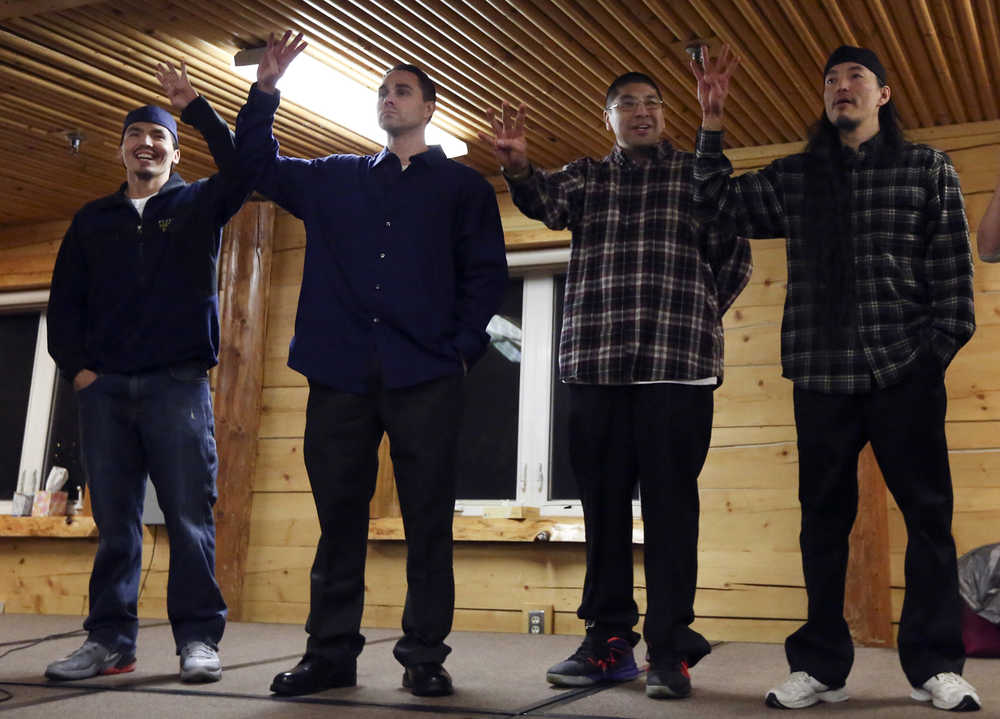ANCHORAGE — An attorney in the Fairbanks Four case said Friday the four indigenous men previously convicted in the 1997 beating death of a teenager were exonerated this week by a settlement that threw out their murder convictions.
The statement by Alaska Innocence Project attorney Bill Oberly contradicted an earlier contention by state prosecutors that the men were not exonerated in the deal.
“They are no longer convicted of the crimes that they were wrongly convicted of,” Oberly said, noting that the men can check the “no” box on future job applications asking if they are convicted felons.
After the deal was reached, the office of Alaska Attorney General Craig Richards said the outcome wasn’t an exoneration.
“In this settlement, the four defendants agreed they were properly and validly investigated, prosecuted and convicted,” the office said in a news release Thursday. “This compromise reflects the attorney general’s recognition that if the defendants were retried today it is not clear under the current state of the evidence that they would be convicted.”
Judge Paul Lyle approved the deal Thursday, and the three men remaining in jail were released later in the day. The agreement bars all four men from suing government entities.
Oberly said the agreement doesn’t prevent Alaska Gov. Bill Walker or state lawmakers from awarding compensation to the men.
“There are certainly other ways compensation could be provided for them,” he said. “But it has to be initiated by the governor or the Legislature.”
Walker’s spokeswoman, Grace Jang, referred the question to the state Department of Law. Kaci Schroeder, a Department of Law spokeswoman, said her agency had no further comment.
The three Alaska Native men and an American Indian — George Frese, Eugene Vent, Marvin Roberts and Kevin Pease — had been convicted of second-degree murder even though they always maintained their innocence in the death of 15-year-old John Hartman.
Alaska Native leaders have long advocated for their release, saying the convictions were racially motivated and emblematic of how Alaska Natives have been treated by the justice system.
The state continued to vigorously defend the convictions through a civil trial that ended in early November.
The state made a surprise offer last week to free the three men who remained behind bars. Roberts has been on parole.
Richards previously acknowledged that some people would be understandably upset by this decision but explained that the resolution was in the best interest of the state.
The Alaska Innocence Project advocated for the men based on the recollections of a Fairbanks man now in prison for murder in California.
William Z. Holmes Sr., who was a senior at Lathrop High School in Fairbanks in 1997, said he was present when Hartman was fatally beaten by a group of four of his Lathrop classmates.
Hartman’s brother, Chris Kelly, testified by phone at the hearing, voicing his objections to the deal. After the hearing, Kelly told The Associated Press he was flabbergasted at the outcome, saying only guilty people would have accepted such an agreement.
“I can’t believe it,” he said. “I feel like my family is completely wronged.”
Walker said in a statement Thursday that he was “glad there was a process available to the Fairbanks Four where all involved could arrive at a mutually acceptable agreement.” He had been considering pardons for the men.
“Justice prevails!” U.S. Sen. Lisa Murkowski, R-Alaska, said in a statement. She had previously asked the state of Alaska to examine whether the convictions were just and the U.S. Department of Justice to determine if there were civil rights violations in the case.
Some Fairbanks Four supporters are calling for an independent investigation for what they are calling a miscarriage of justice. Jang noted Friday that the “settlement was agreed upon by all parties, including legal counsel for the four men.” She said Walker has not received requests for further action in the matter.
Thursday’s deal is more typical than an earlier agreement that was shot down last week by the judge, said Heidi Rummel, a law professor at the University of Southern California Gould School of Law’s post-conviction justice project.
Lyle had said it wasn’t clear to him that he had the authority to free the men after prosecutors neither pardoned them nor offered clemency in the earlier proposal.

